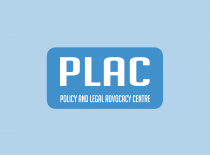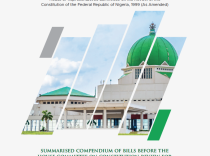The Senate commenced debate on the general principles of the 2018 Appropriation Bill at its plenary session of Tuesday, 28 November 2017. The Bill seeks to authorize the sum of N8, 612, 236, and 953,214 from the Consolidated Revenue Fund as the 2018 Budget.
Leading the debate on the Bill, Sen. Ahmed Lawan (APC: Borno) stated that the deficit of N2.005trillion, which is 1.77% of the GDP, will be financed partly by new borrowings estimated at N1.699trillion; some of which would be sourced externally. However, the Bureau of Public Enterprise (BPE) would source the outstanding sum domestically from the proceeds of privatization of some non-oil assets.
Sen. Lawan also explained that the 2018 budget was designed to support the Federal Government’s long-term objectives for sustainable development, fiscal consolidation, inclusive growth, job creation and welfare stabilization. He noted that an aggregate revenue of 30.8% for the 2018 Budget has been allocated to capital expenditure focused on increasing macro-economic stability; structural reforms; governance and institutional goals and seeks to diversify the economy with key emphasis on agriculture, solid minerals and self-sufficiency in food and other products.
In addition, Sen. Lawan informed Members of the Senate that that the 2018 Budget was predicated on an oil price benchmark of $45 per barrel; oil production estimate of 2.3million barrels/day; exchange rate of N305/$; GDP growth of 3.5%; and an inflation rate of 12.4%. He mentioned that based on these assumptions, the three tiers of government would receive about 12% more revenues in 2018 when compared to the 2017 estimates.
Furthermore, he said that the Federal Government in its commitment to invest in critical infrastructures, allocated key capital spending to the following sectors:
- Power, Works and Housing – N555.88billion
- Transportation – N263.110billion
- Special Intervention Programmes – N150billion
- Defence – N145billion
- Agriculture and Rural Development – N118.98billion
- Water Resources – N95.11billion
- Industry, Trade and Investment – N82.92billion
- Interior – N63.26billion
- Education – N61.73billion
- Universal Basic Education Commission – N109.06billion
- Health – N71.11billion
- Federal Capital Territory – N40.30billion
- Zonal Intervention Projects – N100billion
- North East Intervention Fund – N45billion
- Niger Delta Ministry – N53.89billion
- Niger Delta Development Commission – N71.20billion
The lawmaker also highlighted the following key projects and programmes included for implementation in the 2018 Budget,;
- Mambila Hydro Power Project – N9.8billion including counterpart funding of N8.5billion
- Transmission Lines and Substations – N12billion counterpart funding
- Rural Electrification Access Programme in Federal Universities – N10.15billion
- National Housing Programme – N35.41billion
- Construction of the 2nd Niger Bridge – N10billion
- Construction and Rehabilitation of Strategic roads – N300billion
Lastly, he stated that the 2018 Budget would devote a significant portion of the recurrent expenditure to institutions that provide critical government services such as education, defence, health and interior to ensure that service providers within these sectors are adequately provided for. His lead debate emphasized that the 2018 Budget as projected would consolidate on the achievements of the 2016 and 2017 Budgets and advance Federal Government’s goals as contained in its Economic Recovery and Growth Plan (ERGP).





